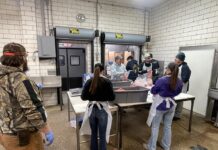The article headline read: Taking your children for a day at the farm? It’s not worth running the risk, warns E. coli expert.
The article, from a British publication, quoted a British professor, Hugh Pennington, who is sounding a clarion call that children under 5 be prevented from visiting farms in that country.
Many British farmers have opened their operations for “agrotourism,” for educational, leisure or vacation purposes. Pennington claims it’s safer to keep young children at home – two years ago, a child died who contracted E. coli 0157:H7 during a farm visit. The family sued for negligence and received a large sum in damages. Since then, increased hygienic precautions have been introduced for children visiting farms in that country.
E. coli infection is usually associated with eating undercooked or contaminated foods or juices, but you can also get infected through manure, water and person-to-person contact.
We’ve had our share of E. coli concerns linked to farm animals in this country.
At a county fair in New York in 1999, E. coli infected the fairgrounds’ drinking water, leading to the deaths of a 3-year-old girl and a 79-year-old man and sickening more than 1,000 other fair visitors. An investigation into the source was inconclusive. The outbreak may have resulted from contamination of a fairgrounds well by a dormitory septic system on the fairgrounds, or from manure runoff from a nearby cattle barn.
Ensuing lawsuits named everyone from the county to the fair board to Cornell University and its extension service.
We’re fortunate a similar E. coli outbreak at the 2000 Medina County Fair was not as deadly.
Last fall, after petting animals at a farm petting zoo in eastern Pennsylvania, eight children were hospitalized – including a 3-year-old treated for kidney failure. All were infected with E. coli.
Last week, the U.S. Centers for Disease Control and Prevention urged more attention is needed at petting zoos and county fairs to prevent E. coli outbreaks. The CDC said E. coli outbreaks last year in at least two states were associated with visits to farms and infected 56 people and led to 19 hospitalizations.
E. coli 0157 causes an estimated 60 deaths and 73,000 illness annually in the United States, the CDC said. Most outbreaks are due to contaminated food or water and not direct transmission from animals, but the risk is real.
“People can become infected by petting farm animals or touching their surroundings that are contaminated with animal feces, and then putting their unwashed hands in or around their mouth,” said John Crump, the CDC epidemiologist who invested the Pennsylvania outbreak.
Common sense says you don’t eat undercooked meat and you don’t put dirty hands in your mouth. But are you going to tell the parents of the Pennsylvania 3-year-old in the intensive care unit that if they kept closer tabs on their child they might have prevented the infection?
When “Farm and Dairy” researched several stories we wrote on last year’s Medina County Fair E. coli outbreak, quite frankly we were surprised at the it-won’t-happen-to-us attitude of other county fair officials contacted. Perhaps the issue wasn’t on their radar screen yet, and perhaps they’ve become more concerned in the last six months. If they haven’t, perhaps the CDC call to action will awake them.
The CDC, which is working with the USDA and the National Association of State Public Health Veterinarians on this matter, says fairs and petting zoos need more handwashing facilities and that food stands and eating areas be removed from animal areas.
No one likes more regulations. But just as agriculture promotes its wholesome products and lifestyle, it should promote food safety and health safety measures. We should be at the forefront of this issue.
Get 4 Weeks of Farm and Dairy Home Delivered










